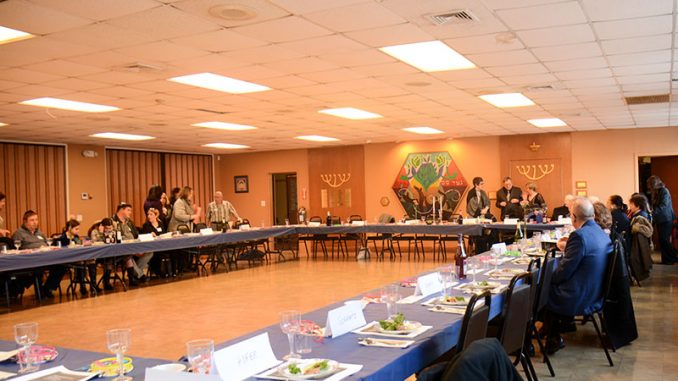
Two Nassau County synagogues, which will merge into one in June, brought their communities together for their first joint Passover Seder last Saturday night.
Temple Emanu-El, in East Meadow, hosted the event in conjunction with Temple B’nai Torah. The event commemorated the final Passover in preparation for the merger.
“It is a fiscal thing,” Cantor Rica Timman from B’nai Torah said. “But it’s also a physical thing. The sanctuary at Emanu-El is falling apart in a way that could not be repaired.”
The two temples have been co-hosting events for a few months to promote the new joint community and to familiarize the members of the temples with each other. The temples are a little less than four miles apart.
“The joining together is a great opportunity as is the community Seder and a lot of people appreciate it,” Gloria Glick, member of Temple B’nai Torah said.
Keeping the communities tighter knit is important in a time where, in America, there has been a lot of very vocal anti-Semitism, Timman said.
The United States has seen a 57% increase in anti-Semitic incidents since 2016, including vandalism and physical attacks, according to statistics compiled by the Anti-Defamation league. All 50 states reported incidents for the first time in over a decade and New York had the most reported incidences of any state.
The most recent anti-Semitic incident on Long Island was on Feb. 21 of 2018 where an Oceanside woman found a swastika and other graffiti on her sidewalk, according to an article published in the Long Island Herald.
“What really hit me this Passover Seder was that we regret the suffering of the Egyptians for our freedom,” Rei Wolfsohn, member of which one of the merging temples, said. “But if we are going to recognize that God is one, any other person in the world is just as much you as you are because you are a part of God. God loves every single one of God’s children equally.”
The Seder for Passover is traditionally a way to tell the story of the Israelites leaving Egypt and breaking free from the slavery. In other words, Passover celebrates freedom.
“The themes of our ancestors, that they were enslaved and need to be freed, we’ve lived that over and over again through the millennium,” Timman said. “I know from my parents, that were Holocaust survivors, that the story of the Seder had tremendous meaning for them as people who were caught in countries that had to escape and find their freedom.”
The Seder is usually held in the home on either the first or second night of Passover, which lasts eight days outside of Israel, but the two temples offered the community event to bring the community together.
“Originally we only had about ten people sign up,” Rita Hofer from Temple B’nai Torah said. “But this was a great opportunity to get to know each other on such a Holy day.”
Both temples practice Reform Judaism, which is denomination that has left behind many of the orthodox ways in favor of evolving technology and the social aspects of the modern world.
Sometimes referred to as “liberal Judaism,” reform temples value the autonomy of each person practicing as they see fit in addition to keeping traditions of reading certain holy books, according to jewishroots.net.
Despite differences in sects of Judaism in terms of practice, Rabbi Asher Vaisfiche from the Chabad of Melville and Huntington believes, regardless of denomination, the Jewish community should stand united and educate people to overcome anti-Semitism.
“More Jewish education—teaching both Jews and non-Jews—about Jewish awareness would help to combat anti-Semitism,” Vaisfiche said. “It’s all about education. If we educate people to do what’s right, that will help for all problems.”
